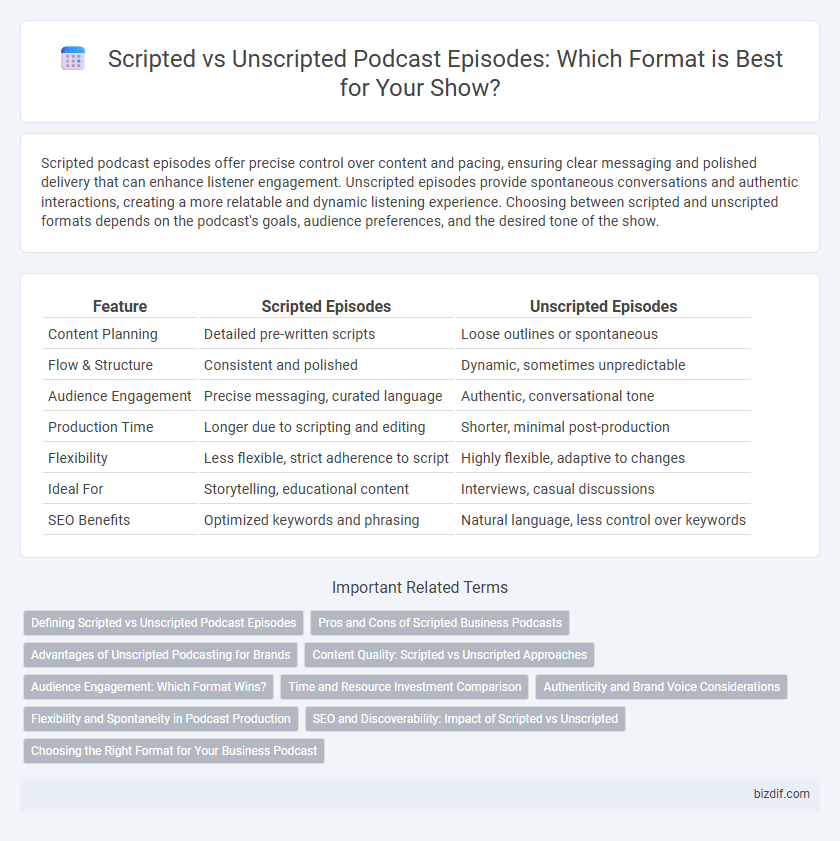Scripted podcast episodes offer precise control over content and pacing, ensuring clear messaging and polished delivery that can enhance listener engagement. Unscripted episodes provide spontaneous conversations and authentic interactions, creating a more relatable and dynamic listening experience. Choosing between scripted and unscripted formats depends on the podcast's goals, audience preferences, and the desired tone of the show.
Table of Comparison
| Feature | Scripted Episodes | Unscripted Episodes |
|---|---|---|
| Content Planning | Detailed pre-written scripts | Loose outlines or spontaneous |
| Flow & Structure | Consistent and polished | Dynamic, sometimes unpredictable |
| Audience Engagement | Precise messaging, curated language | Authentic, conversational tone |
| Production Time | Longer due to scripting and editing | Shorter, minimal post-production |
| Flexibility | Less flexible, strict adherence to script | Highly flexible, adaptive to changes |
| Ideal For | Storytelling, educational content | Interviews, casual discussions |
| SEO Benefits | Optimized keywords and phrasing | Natural language, less control over keywords |
Defining Scripted vs Unscripted Podcast Episodes
Scripted podcast episodes follow a pre-written script, providing structured dialogue, planned content, and precise timing to ensure clarity and coherence. Unscripted episodes rely on spontaneous conversation, allowing hosts and guests to explore topics more freely, fostering authenticity and natural interaction. Understanding these formats helps podcasters choose between controlled narrative delivery and organic, dynamic discussions.
Pros and Cons of Scripted Business Podcasts
Scripted business podcasts offer the advantage of precise messaging, ensuring clarity and professionalism that can enhance brand reputation and listener engagement. They allow for thorough preparation and control over content quality, reducing the risk of errors or off-topic discussions that might dilute key business insights. However, scripted episodes can sometimes lack spontaneity and authenticity, potentially making it harder to connect emotionally with the audience compared to unscripted formats.
Advantages of Unscripted Podcasting for Brands
Unscripted podcast episodes offer brands authentic and spontaneous content that resonates deeply with listeners, fostering stronger emotional connections. This format allows for genuine conversations, highlighting real-time reactions and insights that scriptwriting cannot fully capture. By embracing unscripted podcasting, brands can enhance relatability and build trust, driving higher audience engagement and loyalty.
Content Quality: Scripted vs Unscripted Approaches
Scripted podcast episodes often deliver higher content quality through carefully crafted narratives, polished dialogue, and consistent messaging, ensuring clarity and engagement. Unscripted episodes, while more spontaneous and authentic, can suffer from off-topic tangents and uneven pacing, potentially reducing listener retention. Choosing between scripted and unscripted formats depends on the podcast's goals, target audience, and desired production value.
Audience Engagement: Which Format Wins?
Scripted episodes deliver consistent, polished content that enhances audience engagement through carefully crafted narratives and precise messaging. Unscripted episodes foster authentic interactions and spontaneity, creating a relatable atmosphere that often boosts listener connection and loyalty. Audience engagement ultimately depends on the podcast's target demographic and content goals, with scripted formats excelling in storytelling and unscripted formats thriving in genuine, conversational appeal.
Time and Resource Investment Comparison
Scripted podcast episodes require significant time and resource investment, including thorough research, writing, rehearsing, and editing to ensure polished delivery and coherent storylines. Unscripted episodes demand less preparation time but often require more skill in improvisation and real-time content management, potentially leading to longer post-production for editing filler or errors. Balancing these factors depends on the podcast's goals, with scripted content ideal for narrative precision and unscripted formats better suited for spontaneity and authentic conversations.
Authenticity and Brand Voice Considerations
Scripted podcast episodes ensure consistency in brand voice and message delivery, enhancing professionalism and clarity for the audience. Unscripted episodes foster authenticity and spontaneous engagement, allowing hosts to connect more deeply with listeners through genuine conversations. Choosing between scripted and unscripted formats depends on balancing controlled messaging with the desire for authentic interaction that reflects the podcast's brand identity.
Flexibility and Spontaneity in Podcast Production
Scripted episodes provide a structured framework, ensuring clarity and consistent messaging while limiting on-the-spot deviations. Unscripted episodes offer greater flexibility, allowing hosts to adapt conversations spontaneously, enhancing authenticity and listener engagement. Balancing scripted and unscripted formats optimizes content flow and dynamic interaction within podcast production.
SEO and Discoverability: Impact of Scripted vs Unscripted
Scripted podcast episodes enhance SEO by incorporating targeted keywords and structured content, improving discoverability on search engines and podcast platforms. Unscripted episodes offer organic, authentic dialogue that can boost listener engagement and shareability, indirectly benefiting search rankings through increased audience interaction. Balancing scripted precision with spontaneous authenticity optimizes podcast reach and search visibility across diverse listener preferences.
Choosing the Right Format for Your Business Podcast
Scripted podcast episodes ensure consistency, clarity, and tightly controlled messaging, making them ideal for businesses seeking to reinforce brand identity and deliver precise information. Unscripted episodes foster authenticity, spontaneity, and audience engagement, which can enhance listener connection and showcase company culture more naturally. Selecting the right format depends on your business goals, target audience preferences, and the desired balance between structured communication and genuine interaction.
Scripted episodes vs unscripted episodes Infographic

 bizdif.com
bizdif.com